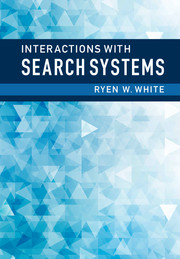1 - Introduction
Published online by Cambridge University Press: 05 March 2016
Summary
Information seeking is a core life activity. People seek information for a number of reasons, including to find facts (Marchionini and Shneiderman, 1988) and to learn and facilitate effective decision making (Marchionini, 2006). Searchers may also have other motivations, such as pleasure and enjoyment (Wilson and Elsweiler, 2010). Historically, people have sought information through interactions with others, either synchronously through in-person or telephone dialog or asynchronously through written communication. Increasingly, information seeking is being conducted via automated search systems such as Web search engines. Meeting searcher requirements across the full spectrum of search goals that individuals may have is challenging with such generic search systems. Nonetheless, search engines are offering an increasing range of reactive and proactive search services to meet and anticipate searcher needs. Helping searchers with specific search tasks requires targeted search support, as well as different methods and criteria under which to evaluate the performance of search systems in different circumstances. For example, fact-finding tasks may require only a single resource or direct answer, and strong system performance may be evidenced by low searcher engagement and short task completion times. In contrast, when the goals involve exploration, learning, or enjoyment, richer search and exploration support may be needed (e.g., diverse results or query suggestions, dynamic information visualizations), and increased engagement over a much longer timespan may be a positive indication of system performance. Understanding the nature of the search task(s) being attempted is important in both designing and evaluating the support offered by search systems.
Effective interactions with automated search systems are a critical aspect of successful searching. These interactions can range in complexity from basic text query entry and result selection to rich gestural and spoken dialog interactions. Search tasks can also continue longitudinally and increasingly, these tasks transcend devices, domains, and applications. The range of search interactions, and the support that systems offer for performing them, is expanding given technological advances. Search systems are becoming more intelligent and more aware of their users’ interests and intentions, as well as of their surroundings when performing searches. This enables these systems to anticipate people's needs more accurately and to work symbiotically with searchers to support task completion directly.
- Type
- Chapter
- Information
- Interactions with Search Systems , pp. 1 - 12Publisher: Cambridge University PressPrint publication year: 2016



